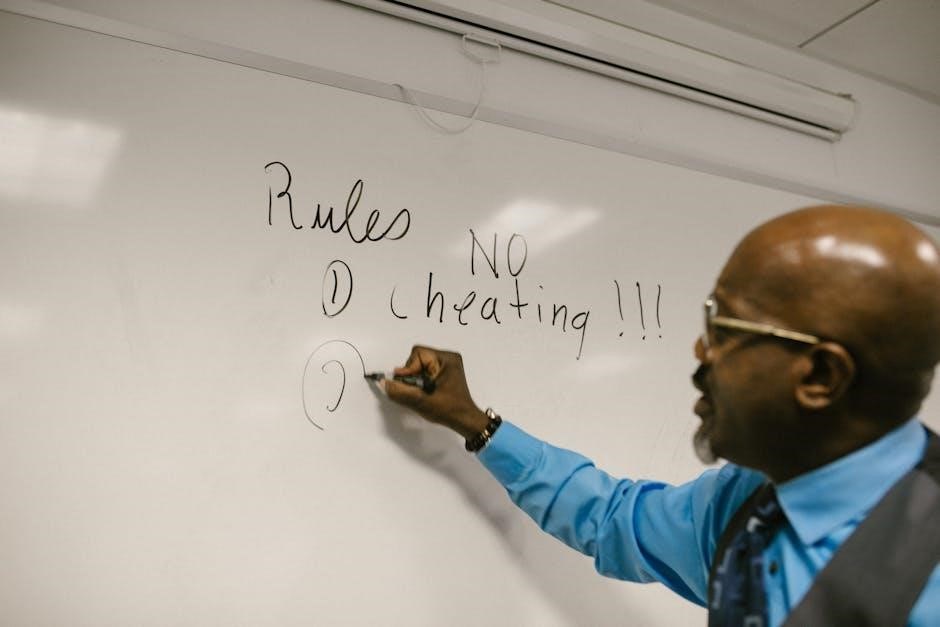The 2024 examination conducting instructions provide a comprehensive framework for ensuring fairness, security, and compliance with updated regulations. They cover digital assessments, health protocols, and permitted devices use.
1.1 Overview of Key Changes for 2024 Examinations
The 2024 examination instructions introduce updated guidelines for digital assessments, enhanced security protocols, and revised procedures for managing technical issues. Key changes include expanded rules for online exams, stricter health and safety measures, and new requirements for permitted devices like calculators. These updates aim to ensure fairness, accessibility, and efficiency in conducting examinations across all levels.
1.2 Importance of Adhering to Guidelines
Adhering to the 2024 examination guidelines is crucial for maintaining fairness, security, and consistency across all assessments. Proper compliance ensures the integrity of the examination process, protects candidate data, and upholds legal standards. Failure to follow guidelines can result in penalties, disqualifications, or invalid results. By adhering to these instructions, examination centers can guarantee a smooth, equitable, and transparent process for all participants.

Pre-Examination Preparation
Pre-examination preparation involves setting up exam rooms, distributing materials, and ensuring all equipment is functional. Timelines and deadlines must be strictly followed to avoid delays or discrepancies.
2.1 Timelines and Deadlines for 2024 Examinations
Examination timelines for 2024 are clearly outlined, with specific deadlines for registration, submission of materials, and scheduling. Centres must adhere strictly to these dates to ensure smooth examination processes. Late submissions may result in penalties or delays. It is essential for all stakeholders to stay informed and comply with the published timelines to maintain the integrity of the examination cycle.
2.2 Setting Up Examination Rooms and Equipment
Examination rooms must be set up to ensure a quiet, secure, and accessible environment for all candidates. Invigilators are responsible for checking and testing all equipment, including audio devices for listening exams. Seating arrangements should prevent cheating, with adequate spacing between candidates. Ensure proper lighting, ventilation, and necessary accommodations for candidates with special needs. All technical requirements for digital exams must be verified beforehand to avoid disruptions during the examination.
2.3 Distributing and Managing Examination Materials
Ensure all examination materials, including question papers and answer sheets, are checked for completeness and accuracy before distribution. Invigilators must securely distribute materials, verifying each candidate’s identity. Digital materials should be accessed through secure, approved platforms. Unused materials must be collected and stored safely after the exam. Strict protocols prevent unauthorized access or cheating during distribution and handling of exam resources.
Conducting the Examination
Examinations require precise timing, clear instructions, and vigilant supervision. Invigilators ensure adherence to rules, handle disruptions, and monitor candidate behavior to maintain exam integrity and fairness.
3.1 Roles and Responsibilities of Invigilators
Invigilators play a crucial role in maintaining exam integrity. They distribute materials, ensure adherence to rules, monitor candidate behavior, and handle emergencies. Their duties include verifying candidate identities, managing time, and reporting incidents. Proper training is essential to ensure they effectively manage exam rooms, uphold fairness, and provide support when needed, ensuring a smooth and secure examination process for all candidates.
3.2 Managing Candidate Behavior During the Exam
Effective management of candidate behavior is vital for a fair exam environment. Invigilators must monitor for misconduct, address disruptions promptly, and ensure compliance with rules. Clear communication of expectations and swift resolution of issues help maintain order. Any violations should be documented and reported according to guidelines, ensuring the integrity and security of the examination process while respecting candidate rights and minimizing distractions.
3.3 Handling Special Cases and Emergencies
Special cases and emergencies require immediate attention to ensure exam integrity and candidate safety. Invigilators must be prepared to handle medical emergencies, technical issues, or unexpected disruptions. Clear protocols for evacuations, first aid, and communication are essential. Special needs candidates should have pre-arranged accommodations. Emergencies must be logged, and procedures followed to minimize disruption while maintaining fairness and security for all candidates. Training and preparedness are key to effective management.

Post-Examination Procedures
Post-examination procedures involve collecting and securing exam papers, submitting results accurately, and maintaining confidentiality to ensure integrity and fairness in the assessment process.
4.1 Collecting and Securing Exam Papers
After the examination, invigilators must collect all papers promptly, ensuring no materials are left behind. Papers should be verified for completeness and secured in sealed, tamper-proof envelopes. Confidentiality must be maintained throughout the process. Exam materials should be stored in a designated, secure area until submission to the awarding body. Proper labeling and documentation are essential to prevent loss or unauthorized access.
4;2 Submitting Results and Feedback
After collecting exam papers, centers must submit results and feedback promptly through secure, designated systems. Confidentiality must be maintained to ensure data integrity. Results should be double-checked for accuracy before submission. Feedback should be constructive, providing insights into candidate performance. Timely submission is crucial to meet deadlines and facilitate further processes. Centers must also retain records for audit purposes and ensure compliance with data protection regulations.
4.3 Maintaining Confidentiality and Security
Maintaining confidentiality and security is critical throughout the examination process. All exam materials must be stored securely, and access restricted to authorized personnel. Electronic data should be encrypted, and passwords protected. Sensitive information, such as candidate details and results, must be handled with utmost care. Breaches of confidentiality can lead to severe consequences. Centers must comply with data protection regulations to ensure the integrity and security of the examination process. This is essential to uphold trust and fairness in the system.
Special Assessments and Requirements
This section outlines guidelines for conducting non-examination assessments, functional skills, and digital examinations, ensuring compliance with 2024 regulations and maintaining assessment integrity.
5.1 Instructions for Conducting Non-Examination Assessments (NEA)
The 2024 guidelines provide clear instructions for conducting NEAs, emphasizing the importance of authenticity, confidentiality, and fairness. Teachers must ensure candidates understand expectations and submit work securely. Digital tools are recommended for efficient management, while maintaining JCQ standards to ensure fair and reliable assessments across all subjects.
5.2 Guidelines for Functional Skills Assessments
The 2024 guidelines for Functional Skills assessments outline the importance of creating a controlled environment for English and Mathematics exams. They emphasize the need to ensure authenticity of student work and adherence to JCQ standards. Centers must provide clear instructions, manage materials securely, and maintain confidentiality to uphold the integrity of the assessments. Digital tools are encouraged to streamline the process effectively.
5.3 Conducting Digital and Online Examinations
Conducting digital and online examinations in 2024 requires robust security measures, including encryption and secure login systems. Centers must ensure reliable internet connectivity and provide technical support to address any issues. Authentication protocols are essential to verify candidate identities. Clear instructions for digital tools and backup plans for technical failures are mandated. Regular updates and training for invigilators are recommended to maintain exam integrity and adapt to emerging technologies.

Technology and Tools in 2024 Examinations
The 2024 examinations utilize advanced digital platforms, AI-driven tools, and security features to enhance efficiency and ensure compliance with updated tech regulations and guidelines.
6.1 Using Calculators and Other Permitted Devices
Calculators and permitted devices must be approved and checked by invigilators before use. Candidates must ensure devices are free from prohibited features. Detailed guidelines for 2024 specify allowed tools and restrictions to maintain fairness and security during exams. Proper usage instructions are provided to avoid disqualification. Always verify device compliance with JCQ and awarding body rules before the exam starts.
6.2 Managing Technical Issues During Exams
Identify and address technical issues promptly to minimize disruptions. Ensure backup systems are in place for digital exams. Communicate clearly with candidates and invigilators during resolving. Document all incidents post-exam for review. Maintain exam integrity and fairness, adhering to JCQ guidelines. Ensure all candidates are treated equally and procedures are followed consistently to uphold security and fairness throughout the process.

Candidate Instructions and Guidelines
Candidates must arrive early, bring required materials, and follow invigilators’ instructions. Strict adherence to rules ensures exam integrity and fairness for all participants.
7.1 Important Instructions for Candidates
Candidates must arrive at least 10 minutes before the exam start time and bring valid identification and required materials. Electronic devices, except permitted calculators, are prohibited. Candidates must follow invigilators’ instructions, remain silent during exams, and avoid any form of malpractice. Failure to comply may result in penalties. Candidates with special needs should notify exam centers in advance for accommodations. Strict adherence to health and safety protocols is mandatory.
- Arrive early to avoid delays.
- Bring essential materials only.
- Adhere to exam room rules.
- Notify centers about special requirements.
- Follow COVID-19 safety measures;
7.2 Preparing Candidates for Examination Day
Candidates should thoroughly review exam schedules, locations, and timings. Ensure all necessary materials, like pens and calculators, are prepared. Familiarize yourself with exam rules and formats. Practice time management and question strategies. Visit the exam venue beforehand to reduce anxiety. Read and understand all instructions provided by the exam center. Avoid last-minute cramming and ensure adequate rest before the exam. Stay informed about any updates or changes.
- Review and confirm exam details.
- Organize required materials in advance.
- Understand exam rules and formats.
- Plan time management strategies.
- Stay updated on exam instructions.

Health and Safety Protocols
Ensure compliance with all health and safety regulations during exams. Prepare for emergencies and provide a safe environment for candidates and staff. Adhere to COVID-19 guidelines strictly.
8.1 COVID-19 Safety Measures for 2024 Exams
Ensure all candidates and staff wear masks in exam rooms. Maintain social distancing where possible. Provide hand sanitizer and conduct regular cleaning. Follow local health guidelines strictly. Adhere to updated COVID-19 safety protocols for 2024 exams to minimize risks. Ensure ventilation in exam halls and avoid overcrowding. Candidates with symptoms must follow isolation procedures. Refer to the latest JCQ guidelines for detailed instructions. Safety measures are non-negotiable to protect everyone involved.
8.2 Protective Equipment for Laboratory Exams
Ensure all candidates wear appropriate protective equipment during laboratory exams, such as gloves, lab coats, and goggles. Face shields may be required for certain experiments. Verify equipment is in good condition and properly sanitized. Candidates must follow safety protocols strictly. Supervisors should enforce the use of protective gear at all times. Adhere to specific guidelines for handling hazardous materials. Proper safety measures ensure a secure examination environment for all participants. Always maintain hygiene standards.

Future Trends in Examination Conducting
Emerging technologies like AI and virtual reality are transforming exam processes, enhancing security and candidate experiences. Continuous improvement in digital assessment tools ensures efficient and secure examination practices globally.
9.1 Emerging Technologies in Assessment
Emerging technologies like AI and virtual reality are transforming assessment processes. AI enhances automated grading and detects malpractices, while VR creates immersive exam environments. Blockchain ensures data security, preventing tampering. These innovations aim to make exams more efficient, secure, and accessible, shaping the future of assessment. They also support personalized learning and real-time feedback, ensuring a fair and transparent evaluation process for all candidates globally.
9.2 Continuous Improvement in Exam Processes
Continuous improvement in exam processes involves regular feedback loops, digital tool integration, and updated guidelines. institutions adopt iterative methods to refine assessment practices, ensuring alignment with educational goals. Feedback from candidates and educators helps identify areas for enhancement. Updated guidelines and interactive formats ensure exams remain relevant and effective, fostering a culture of ongoing development and excellence in assessment methodologies.
